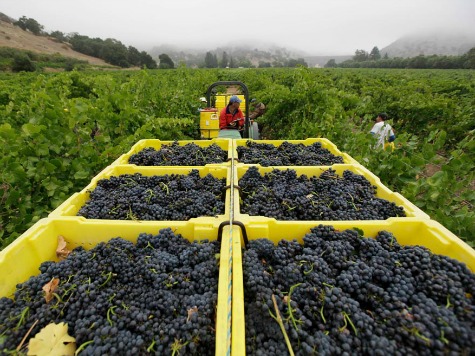The rain didn’t come to California last year, but it is was raining “Benjamins” on Capitol Hill as the Central Valley’s Paramount Farm interests contributed $457,000 to Congress, and the Westlands Water District spent $1,600,000 on lobbying and outreach last year.
According to PublicCEO, the reason for a surge in farmers investing in Washington, D.C. is that after three years of devastating drought, Congress and federal agencies are moving to release more water and both Paramount and Westlands are supporting competing bills for which group should get more water.
There is a saying in California that “whiskey is for drinking and water is for fighting.” The modern fighting over California water is punched-out by making political donations and retaining high-priced lobbyists to influence appreciative friends on K Street and Capitol Hill.
Lynda and Stewart Resnick, for example, are the multi-billionaire owners of Paramount Farms and Fiji bottled water, and have a controlling interest in the Kern Water Bank Authority that stores underground supplies of water to irrigate Paramount’s nut trees in Kern County. The Resnicks and their employees generously gave nearly $457,000 to candidates, political action and party committees since 2011. About two-thirds of Paramount’s contributions came directly from the Resnicks.
Westlands is the nation’s largest water district and services customers that own 600,000 acres of farmland in Fresno and Kings Counties. Westlands spent about $100,000 a year in lobbying in the decade from 2000 to 2010. But as the drought began in 2011, Westland’s lobbying costs have gone straight up and are now six times as much in 2013 as in 2010. The 2014 totals will not be available until the end of the year, but Westlands hired four more firms in 2014 and now has eight registered lobbyists.
According to an internal document obtained by Southern California Public Radio, Westlands also paid $90,000 last year to former California Democratic Rep. Tony Coelho for “Washington representation,” which has not been listed on lobbying reports. Westlands also paid another firm about $1 million for an “outreach and awareness” campaign.
California farmers grow nearly half the nation’s fruits, vegetables and nuts. The California Farm Water Coalition estimates that farmers, and the processors and truckers they work with, may suffer up to $5 billion in drought-related losses this year. The human and political costs of the multi-year drought have brought President Obama, the House Speaker John Boehner and Rep. Doc Hastings (R-WA), Chairman of the House Natural Resources Committee, to the Central Valley to express their concerns.
The Republican House passed drought legislation, authored by freshman Rep. David Valadao of Hanford and co-sponsored by the state’s entire GOP delegation, that would extend and guarantee for 40 years all water deliveries under existing federal service contracts, including the largest one held by Westlands. The legislation enraged environmentalists, who want to be able to interrupt water deliveries whenever they believe any river fish are threatened.
The environmentalists thought they had the drought legislation stymied in the Senate by their Democratic allies, including California’s powerful Senators, Diane Feinstein and Barbara Boxer. But Feinstein and Boxer may have “switched over to be on the side of farmers instead of endangered fish when it comes to water allocations.” Feinstein’s version of a water bill would allow regulators to “provide the maximum quantity of water supplies possible” to where they are “most needed,” and boost existing federal drought programs by $200 million.
The major differences between the House and Senate bills are several provisions that would allow water from the Sacramento-San Joaquin River delta to be sent farther south to Kern County, where it would be available to the Kern Water Bank Authority, allegedly “controlled by Feinstein’s supporters–the Resnicks.” Feinstein also recently revised her bill to boost Colorado River storage in Nevada, home to Senate Majority Leader Harry Reid. That strategic version could allow the bill to reach the Senate floor for a vote without going through the normal, contentious committee hearing process.
The California Department of Water Resources and the U.S. Bureau of Reclamation just released their “Drought Operation Plan” on April 9. The plan undermines the environmentalists’ ability to delay implementation of the drought legislation by providing state and federal policy approval for both the House and the Senate drought legislation.
Either way, farmers may be about to get a very good return on their investments in Washington, D.C.

COMMENTS
Please let us know if you're having issues with commenting.